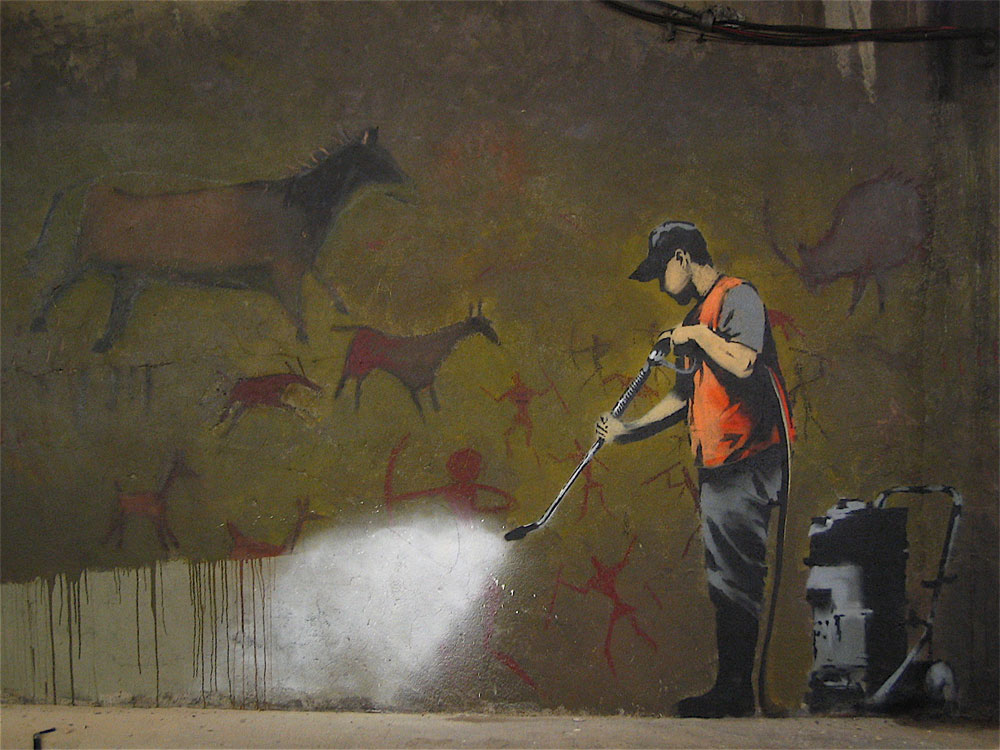5/31/08
-The Onion
oops, I mean:
-The New York Times, "Hush, Mama, Don't You Cry, a New Yellow Wiggle Will Sing"
5/30/08
5/29/08
_
Mead and Role-Taking
Role-taking often occurs through play and games, as children try out different roles (such as being mommy, daddy, doctor, teacher) and gain an appreciation of them.... Then the person begins to construct his or her own roles (role-making) and to anticipate other individuals' responses. Finally, the person plays at her or his particular role (role-playing).
-Diana Kendall, Sociology in Our Times
-The New York Times, "Philosophy, Mystery, Anarchy: All is 'Lost'"
5/28/08
5/27/08
-Magdalena Jetelova
5/26/08
5/25/08
These Poems, She Said
-Robert Bringhurst
5/24/08
Black milk of daybreak we drink it at sundown
we drink it at noon in the morning we drink it at night
we drink it and drink it
we dig a grave in the breezes there one lies unconfined
A man lives in the house he plays with the serpents he writes
he writes when dusk falls to Germany your golden hair Margarete
he writes it ans steps out of doors and the stars are flashing he whistles his pack out
he whistles his Jews out in earth has them dig for a grave
he commands us strike up for the dance
Black milk of daybreak we drink you at night
we drink you in the morning at noon we drink you at sundown
we drink and we drink you
A man lives in the house he plays with the serpents he writes
he writes when dusk falls to Germany your golden hair Margarete
your ashen hair Sulamith we dig a grave in the breezes there one lies unconfined
He calls out jab deeper into the earth you lot you others sing now and play
he grabs at the iron in his belt he waves it his eyes are blue
jab deeper you lot with your spades you others play on for the dance
Black milk of daybreak we drink you at night
we drink you at noon in the morning we drink you at sundown
we drink and we drink you
a man lives in the house your golden hair Margarete
your ashen hair Sulamith he plays with the serpents
He calls out more sweetly play death death is a master from Germany
he calls out more darkly now stroke your strings then as smoke you will rise into air
then a grave you will have in the clouds there one lies unconfined
Black milk of daybreak we drink you at night
we drink you at noon death is a master from Germany
we drink you at sundown and in the morning we drink and we drink you
death is a master from Germany his eyes are blue
he strikes you with leaden bullets his aim is true
a man lives in the house your golden hair Margarete
he sets his pack on to us he grants us a grave in the air
He plays with the serpents and daydreams death is a master from Germany
your golden hair Margarete
your ashen hair Shulamith
-Paul Celan
5/23/08
Let it start to rain,
the streets are empty now.
Over the roof hear the leaves
coldly conversing in whispers;
a page turns in the book
left open by the window.
The streets are empty, now
it can begin. I am not there.
Like you
I wasn't present
at the burial. This morning
I have walked out
for the first time
and wander here
among the blind
flock of names
standing still
in the rain —
(the one on your stone
will remain
listed in the telephone books
for a long time, I guess, light
from a disappeared star . . .)
— just to locate the place,
to come closer, without knowing where you are
or if you know I am there.
-Franz Wright
5/22/08
-Albert Clawson, "Origin of Scriptures"
[via it loved to happen]
-W.H. Auden, The Dyer's Hand
5/21/08
[Wikipedia]
-First Principles, Conservative Postmodernism, Postmodern Conservatism
5/20/08
"I don't know whether you'd try to, but you certainly would: that I must in candour admit!" he exclaimed with an anxious laugh.
"I mustn't-I can't," cried the girl.
"Well, if you're bent on being miserable I don't see why you should make me so. Whatever charms a life of misery may have for you, it has none for me."
"I'm not bent on a life of misery," said Isabel. "I've always been intensely determined to be happy, and I've often believed I should be. I've told people that; you can ask them. But it comes over me every now and then that I can never be happy in any extraordinary way; not by turning away, by separating myself."
"By separating yourself from what?"
"From life. From the usual chances and dangers, from what most people know and suffer."
-Henry James, The Portrait of a Lady, volume 1, chapter 14
A thrush, because I’d been wrong,
Burst rightly into song
In a world not vague, not lonely,
Not governed by me only.
— Richard Wilbur, On Having Mis-identified A Wild Flower
[via it loved to happen]5/19/08
- J. Mitchell Morse (1972)
[via morethan95theses]
-Paul Valery, "Letter about Mallarme"
SOCRATES
ERYXIMACHUS
-Paul Valery, Dance and the Soul
5/18/08
According to Foucault, human knowledge does not merely allow us to exercise power over nature as Bacon had suggested; more significantly, knowledge is violence. The act of knowing, says Foucault, is always an act of violence.
-Stanley J. Grenz, A Primer on Postmodernism
5/17/08
—
Hope is the virtue by means of which suspicion can be overcome. The charitable reader offers the gift of constant and loving attention—faithfulness—to a story, to a poem, to an argument, in hope that it will be rewarded. But this hope involves neither demand nor expectation; indeed, if it demanded or expected it would not be hope.
-Dr. Alan Jacobs, A Theology of Reading
[via an ecstasy of particulars]
5/15/08
-Oscar Wilde, "The Decay of Lying"
5/14/08
9. Well, I like poetry that is amusing, that maybe makes me chuckle a little. I'd rather read something reassuring and light than something complicated or gloomy. Is that bad? Does that mean I am a jerk?
Yes.
[Frequently Asked Questions About Poetry]
-Harold Bloom, Genius
5/13/08
____________
At times I think and at times I am.
-Paul Valery
- Wikipedia
The sun shone, having no alternative, on the nothing new. Murphy sat out of it, as though he were free, in a mew in West Brompton.Excerpt from the end when Murphy's ashes are scattered:
Some hours later Cooper took the packet of ash from his pocket, where earlier in the evening he had put it for greater security, and threw it angrily at a man who had given him great offence. It bounced, burst, off the wall on to the floor, where at once it became the object of much dribbling, passing, trapping, shooting, punching, heading and even some recognition from the gentleman's code. By closing time, the body, mind and soul of Murphy were freely distributed over the floor of the saloon; and before another dayspring greyened the earth had been swept away with the sand, the beer, the butts, the glass, the matches, the spits, the vomit.
-The saying Harold Bloom won't stop using, by Heinrich Heine
-from The Western Canon, by Harold Bloom
5/12/08
-What popped into someone's head when they saw the Discovery Channel logo at BrandTag (a brand is what people say it is)
by Shel Silverstein
The traffic light simply would not turn green
So the people stopped to wait
As the traffic rolled and the wind blew cold
And the hour grew dark and late.
Zoom-varoom, trucks, trailers,
Bikes and limousines,
Clatterin' by - me oh my!
Won't that light turnt green?
But the days turned weeks, and the weeks turned months
And there on the corner they stood,
Twiddlin' their thumbs till the changin' comes
The way good people should.
And if you walk by that corner now,
You my think it's rather strange
To see them there as they hopefully gaze
With the very same smile on their very same face
As they patiently stand in the very same place
And wait for the light to change.
5/11/08
-C.S. Lewis, introduction to Lilith
5/6/08
Without Ceremony
by Vassar Miller
Except ourselves, we have no other prayer;
Our needs are sores upon our nakedness.
We do not have to name them; we are here.
And You who can make eyes can see no less.
We fall, not on our knees, but on our hearts,
A posture humbler far and more downcast;
While Father Pain instructs us in the arts
Of praying, hunger is the worthiest fast.
We find ourselves where tongues cannot wage war
On silence (farther, mystics never flew)
But on the common wings of what we are,
Borne on the wings of what we bear, toward You,
Oh Word, in whom our wordiness dissolves,
When we have not a prayer except ourselves.
by Kenneth Patchen
The old guy put down his beer.
Son, he said,
(and a girl came over to the table where we were:
asked us by Jack Christ to buy her a drink.)
Son, I am going to tell you something
The like of which nobody was ever told.
(and the girl said, I've got nothing on tonight;
how about you and me going to your place?)
I am going to tell you the story of my mother's
Meeting with God.
(and I whispered to the girl: I don't have a room,
but maybe...)
She walked up to where the top of the world is
And He came right up to her and said
So at last you've come home.
(but maybe what?
I thought I'd like to stay here and talk to you.)
My mother started to cry and God
Put His arms around her.
(about what?
Oh, just talk...we'll find something.)
She said it was like a fog coming over her face
And light was everywhere and a soft voice saying
You can stop crying now.
(what can we talk about that will take all night?
and I said that I didn't know.)
You can stop crying now.
Many have written last thoughts and last letters
None know if our deaths are now or forever
None know if this wandering earth will be found
-Archibald MacLeish, "An Epistle to Be Left in the Earth"
-D. H. Lawrence
by Francisco Alarcón
pardon
the lag
in writing you
we were left
with few
letters
in your home
we were cast
as rugs
sometimes
on walls
though we
were almost
always
on floors
we served
you as
a table
a lamp
a mirror
a toy
if anything
we made
you laugh
in your kitchen
we became
another pan
even now
as a shadow
you use us
you fear us
you yell at us
you hate us
you shoot us
you mourn us
you deny us
and despise
everything
we
continue
being
us
America
understand
once and for all:
we are
the insides
of your body
our faces
reflect
your future
[via 3quarksdaily]
5/5/08
-D.H. Lawrence, "The Horse Dealer's Daughter"
by Charles Bukowski
I've seen old married couples
sitting in their rockers
across from one another
being congratulated
for staying together 60 or 70
years,
either of whom
would
long ago have
settled for something
else, anything else,
but fate
fear and
circumstances have
bound them
eternally together;
and as we tell them
how wonderful
their great and enduring love
is
only they
really know
the truth
but they don't tell us
that from the first day they
met
somehow
it didn't mean
all that much:
like
waiting for death
now
it was just an endless determination to
endure.
- Douglas Hofstadter, Godel, Escher, Bach
[via An Ecstasy of Particulars]
5/4/08

While Wheaton College does not keep hard numbers, Dr. Jones said, it employs dozens of divorced faculty and staff members who are allowed to join or remain at the school because the circumstances of their divorces complied with biblical standards. In his 12 years as provost, Dr. Jones recalled only one professor who was fired because of a divorce.
...
“I want them to know that God does not desert you when life suddenly gets real on you,” Dr. Gramm said. “And I want them to know that you can be a responsible, reasonable and decent person and not be able to work out a marriage with another responsible, reasonable and decent person.”
__________
After all, the world is not a stage -- not to me: nor a theatre: nor a show-house of any sort. And art, especially novels, are not little theatres where the reader sits aloft and watches... and sighs, commiserates, condones and smiles. That's what you want a book to be: because it leaves you so safe and superior, with your two-dollar ticket to the show. And that's what my books are not and never will be. Whoever reads me will be in the thick of the scrimmage, and if he doesn't like it -- if he wants a safe seat in the audience -- let him read someone else.
-D. H. Lawrence
The term "emergent" was coined by the pioneer psychologist G. H. Lewes, who wrote:
"Every resultant is either a sum or a difference of the co-operant forces; their sum, when their directions are the same -- their difference, when their directions are contrary. Further, every resultant is clearly traceable in its components, because these are homogeneous and commensurable. It is otherwise with emergents, when, instead of adding measurable motion to measurable motion, or things of one kind to other individuals of their kind, there is a co-operation of things of unlike kinds. The emergent is unlike its components insofar as these are incommensurable, and it cannot be reduced to their sum or their difference."[here]
-Christopher Hampton
5/3/08
-Peter Rollins











